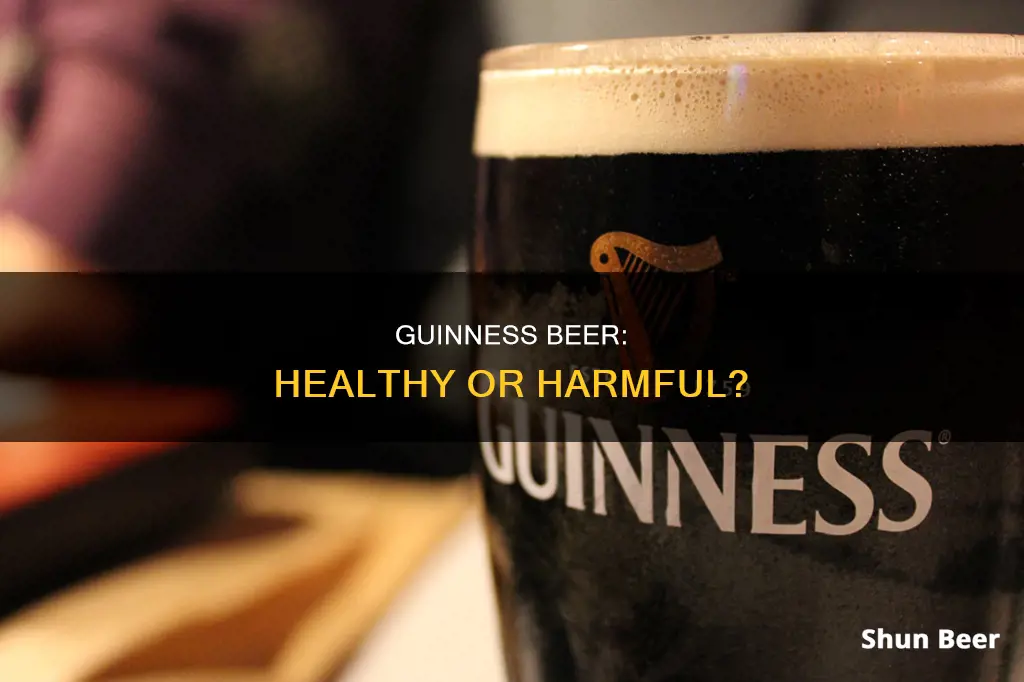
Guinness, a stout beer, has long been associated with health claims, with slogans such as Guinness is good for you and Guinness for Strength used in its advertising campaigns during the 1920s, '30s, and '40s. While it may not be as nutritious as a vegetable, stouts like Guinness do have some nutritional benefits. In this paragraph, we will explore the topic of whether Guinness is a healthy beer by examining its nutritional content, calorie count, and potential health benefits and risks.
| Characteristics | Values |
|---|---|
| Calories | Guinness has fewer calories than most other beers. A 12-ounce serving of Guinness Draught has 125 calories, while Budweiser has 145, Heineken has 142, and Samuel Adams Cream Stout has 189. |
| Alcohol Content | Guinness has a lower alcohol content than other beers, at 4.2% alcohol by volume, compared to 5% for Budweiser and Heineken, and 4.9% for Samuel Adams Cream Stout. |
| Antioxidants | Guinness contains antioxidants, which may have heart health benefits and may reduce the risk of blood clots forming in the arteries. |
| B Vitamins | Guinness contains B vitamins, including folate, which is important for making DNA and other genetic material. |
| Fiber | Guinness has higher levels of fiber compared to other beers due to its high barley content. |
| Ferulic Acid | The high barley content in Guinness also provides ferulic acid, which is associated with improved immune function. |
| Silicon | Guinness contains silicon, which may help protect against osteoporosis and maintain bone density, healthy teeth, and nails. |
| Cholesterol | The soluble fiber in Guinness can help reduce "bad" LDL cholesterol and promote healthy blood sugar and cholesterol levels. |
| Inflammation | The hops and fiber content in Guinness may have anti-inflammatory effects. |
| Marketing | Guinness has historically marketed its product with slogans such as "Guinness is good for you" and "Guinness for Strength," implying health benefits that may not be supported by scientific evidence. |
What You'll Learn

Guinness is low in calories compared to other beers
While Guinness is not a health food, it does have some nutritional benefits and is lower in calories than many other beers.
A 12-ounce serving of Guinness contains just 125 calories, which is less than many other types of beer. For example, the same size serving of Budweiser has 145 calories, Heineken has 142 calories, and Samuel Adams Cream Stout has 189 calories. Even Guinness Extra Stout, which has a slightly higher alcohol content, only has 149 calories.
The reason for Guinness's lower calorie count is its relatively low alcohol content. Guinness Draught has an alcohol content of 4.2% by volume, compared to 5% for Budweiser and Heineken, and 4.9% for Samuel Adams Cream Stout. Since alcohol is the main source of calories in beer, Guinness's lower alcohol content translates to a lower calorie count.
In addition to being lower in calories, Guinness also has a unique nutritional profile compared to other beers. It is a good source of iron, which is essential for healthy blood and immune function. A 12-ounce serving of Guinness provides almost 4% of your daily recommended intake of iron.
Guinness also contains antioxidants, which can help reduce inflammation and protect against various health problems. These antioxidants are particularly beneficial for maintaining healthy skin and preventing damage caused by free radicals.
Furthermore, Guinness is a source of B vitamins, including folate and vitamin B6. Folate is necessary for making DNA and other genetic material, while vitamin B6 supports brain function and mood.
While Guinness may have some nutritional benefits and is lower in calories than some other beers, it is still important to consume it in moderation as part of a balanced diet. Excessive alcohol consumption can lead to weight gain and various health problems, including liver disease, pancreatitis, and high blood pressure. Therefore, while Guinness may be a slightly healthier option compared to some other beers, it should still be enjoyed in moderation as part of a healthy lifestyle.
The Irish Pride: Guinness Beer's Roots and Heritage
You may want to see also

It has antioxidant properties
Guinness, like other beers, contains a significant amount of antioxidants. In particular, Guinness contains flavonoids, a plant-based antioxidant also found in certain drinks and dark chocolate. Flavonoids are associated with heart health. A 2003 study claimed that a pint of Guinness could cut the risk of blood clots forming in the arteries, while other beers did not have the same effect.
The barley in beer also contributes antioxidants to your beverage. These heart-healthy polyphenols from barley and hops have been shown to lower cholesterol, reduce your risk for heart disease and protect against free radicals.
In addition to antioxidants, Guinness contains B vitamins, silicon, soluble fiber, and prebiotics. Beer is made with barley, a whole grain that contributes these nutrients to your drink.
While Guinness does contain antioxidants and other beneficial nutrients, it is important to remember that alcohol consumption can also have negative health effects. Heavy drinking and binge drinking are associated with health problems such as liver disease, pancreatitis, and high blood pressure. Additionally, alcohol consumption can increase the risk of certain cancers. Therefore, it is important to consume Guinness and other alcoholic beverages in moderation.
Guinness Beer and Coffee: What's the Connection?
You may want to see also

It's rich in vitamins and fibre
Guinness is a stout beer with a rich history. It is made from five main ingredients: roasted barley, malted barley, hops, yeast, and water. The beer is known for its distinctive dark, ruby-red colour and creamy head.
Guinness contains a fair amount of folate, a B vitamin that our bodies need to make DNA and other genetic material. It is also necessary for cells to divide. Guinness is also one of the beers with the highest levels of fibre, as it contains a lot of unmalted barley, which has more fibre than malted grain.
In addition to folate, Guinness contains several other B vitamins, including B1 (thiamin), B2 (riboflavin), B3 (niacin), B6, and B9 (folate). These B vitamins play essential roles in energy metabolism and overall health.
Guinness also contains a moderate amount of iron, with approximately 0.3 milligrams per 12-ounce serving. While this may not meet your daily iron requirements, it can contribute to your overall iron intake when consumed in moderation.
So, while Guinness may not be as healthy as a vegetable, it does contain a variety of vitamins and fibre that can provide some nutritional benefits. However, it's important to remember that excessive alcohol consumption can lead to health issues, so it's crucial to enjoy Guinness in moderation and according to recommended guidelines.
Guinness Beer and Caffeine: What's the Connection?
You may want to see also

Guinness contains iron
Guinness, the famous stout beer, has long been associated with the slogan "Guinness is good for you". While it is not a health drink, there is some truth to the claim that Guinness contains iron.
Guinness is made from a grist (grain) that includes a large amount of roasted barley, which gives it its intense flavour and very dark colour. It is also one of the beers with the highest levels of fibre. The barley in Guinness is a good source of iron, with around 0.3mg of iron per pint. While this is not a significant amount, it is still more than is found in most other beers. In the past, Guinness was even given to people after they had given blood, to help replenish their iron stores.
However, it is important to remember that Guinness is still an alcoholic drink, and consuming too much can have negative effects on your health. Heavy drinking is associated with many health problems, including liver disease, pancreatitis and high blood pressure.
So, while it is true that Guinness contains some iron, it is not a significant source of this nutrient and should not be relied upon as a way to increase your iron intake. A healthier way to get iron into your diet is by eating plenty of leafy green vegetables, beans and nuts.
Guinness Beer: German or Irish?
You may want to see also

It's good for your bones
Beer contains a plant hormone called phytoestrogen, which is key to building dense bones. It also has calcium and dietary silicon, which are important for the growth and development of bone and connective tissues.
Guinness contains a fair amount of dietary silicon, a mineral that may help protect against osteoporosis. Studies have shown that moderate beer drinkers are less likely to have osteoporosis and are at a lower risk of hip fractures. However, it is important to note that overindulging can have reverse effects.
Osteoporosis is a condition that causes bones to gradually thin and weaken, leaving them at greater risk of fractures. About 2 million fractures in the US each year are due to osteoporosis. Although all bones can be affected by the disease, the bones of the spine, hip, and wrist are most likely to break. In older people, hip fractures can be particularly dangerous. Staying still for a long time during the healing process can lead to deadly complications, such as blood clots or pneumonia.
Of the estimated 10 million Americans who have osteoporosis, at least 80% are women. Experts believe this is because women's bones tend to be lighter and less dense, and because their bodies go through hormonal changes after menopause that speed up the loss of bone mass.
Guinness Beer Mixology: Creative Concoctions for a Unique Taste
You may want to see also
Frequently asked questions
Guinness has been marketed as a healthy beer, with slogans like "Guinness is good for you" and "Guinness for Strength". However, it is important to remember that alcohol has its downsides and should be consumed in moderation.
Guinness has been found to have some unique and surprising health properties. Some evidence suggests that it can reduce the risk of cardiovascular disease and has more antioxidant properties than other beers. It also contains small levels of iron, is low in calories, and is high in fibre.
Excessive alcohol consumption can have negative effects on the body, including weight gain, liver disease, pancreatitis, and high blood pressure. It is important to consume Guinness in moderation and be aware of how alcohol affects the body.
Guinness has a lower alcohol content (ABV) than most beers, at 4.2% compared to the average of 5%. It also has fewer calories than many other beers and is high in fibre, which can aid digestion.
While Guinness has been traditionally recommended for pregnant and breastfeeding women, experts now advise against consuming any alcohol during pregnancy. Alcohol can cause birth defects and damage to the fetal brain and other organ systems. While the alcohol concentration in breast milk is low, it is still advisable to avoid drinking while breastfeeding to ensure the safety of the baby.







